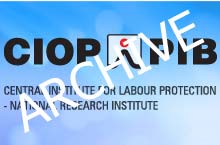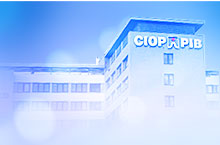- Innovation of employees in the aspect of psychosocial factors of work environment
Zofia Mockałło, p. 8-11
- Microbial contamination of metalworking fluids
Marcin Cyprowski, p. 16-19
- Harmful biological agents in dental care facilities
Anna Ławniczek - Wałczyk, Małgorzata Gołofit-Szymczak, Marcin Cyprowski, Rafał Górny, p. 20-23
- Physical workload of women working at flower production
Piotr Kaczmarek, p. 24-26
- A smart active structural acoustic control utilizing neural networks and genetic algorithm
Tomasz Krukowicz, Leszek Morzyński, p. 27-29
- Importance of information in building knowledge-based economy – international sources of information on “green“ economy
Barbara Szczepanowska, p. 30-31
Innovation of employees in the aspect of psychosocial factors of work environment
Zofia Mockałło
This article provides an introduction to the issue of innovation. It presents the definition of innovation as well as data on it in Poland. It explains how innovation depends on psychosocial work environment factors and presents studies documenting these relations. Among the psychosocial working conditions associated with the innovation of employees are: climate for creativity in a workplace, leadership style of management, quality of relationships between supervisors and employees, work complexity, employee autonomy and individual differences (creative personality, motivation, self-awareness, openness to experience).
Microbial contamination of metalworking fluids
Marcin Cyprowski
Metalworking fluids are commonly used in metal cutting processes. The presence of water and different organic substrates creates conditions favorable for microbial growth, mainly bacteria. The bacterial and fungal species may also include human pathogens. During work of metalworking tools, the cutting fluids are released into the air as an oil mist, whose particles have the ability to transport biological agents. The observed concentrations of bioaerosols may exceed the proposed threshold limit values. This can have negative impact on the proper functioning of the respiratory system of exposed workers.
Harmful biological agents in dental care facilities
Anna Ławniczek - Wałczyk, Małgorzata Gołofit-Szymczak, Marcin Cyprowski, Rafał Górny
The main occupational hazard for medical service personnel in dental surgeries are contact with the patient''''''''''''''''s blood, saliva and bioaerosol released during dental treatment with high-speed rotating instruments. The personnel in dental surgeries may be directly exposed to potentially harmful biological agents such as viruses, bacteria and fungi. Therefore, both a reliable risk assessment and application of proper preventive measures are crucial in protection against infections and other adverse health outcomes.
Physical workload of women working at flower production
Piotr Kaczmarek
The evaluation of workload of women cultivating roses in greenhouses was performed with the energy input measures carried out with the MWE-1 meter, which measured the one-minute-ventilation of lungs in the act of the effort. The article contains partial results of measurement carried out within four months, which present the quantity of the used energy on the performance of typical activities of employees. The problem related to the lack of the literature on the subject of work of women in greenhouses, their exposure to hazards related to performed tasks and also on their workload level, has been discussed.
A smart active structural acoustic control utilizing neural networks and genetic algorithm
Tomasz Krukowicz, Leszek Morzyński
In this paper a algorithm for smart active structural acoustic control systems is presented. The algorithm utilizes neural networks and a genetic algorithm. Derivation of the algorithm is preceded by a brief overview about smart materials and smart structures including the description of the phenomena that may decrease efficiency control of the classic approach over smart active structural acoustic systems. Examples of numerical simulations of performance smart active structural acoustic control systems are presented which show that by using proposed algorithm in smart active structural acoustic control systems high noise reduction can be assured.
Importance of information in building knowledge-based economy – international sources of information on “green“ economy
Barbara Szczepanowska
In the article, the subject of the new economic trend, so-called “green” economy, has been shortly described. This subject was the main theme of this year’s information campaigns of the International Labour Organization. The main sources of information on the green economy were presented, among others were those presented on the ILO website. The importance of promoting the information on occupational hazards and ways of avoiding them and assuring the safe and healthy work places was underlined among the “green” economy workers. The role of information institutions in the promotion of information on green economy, which supports the work of OSH specialists, are emphasized.
|









